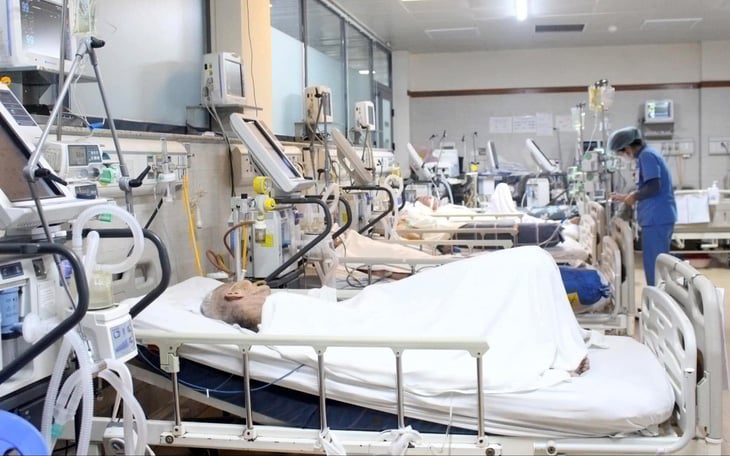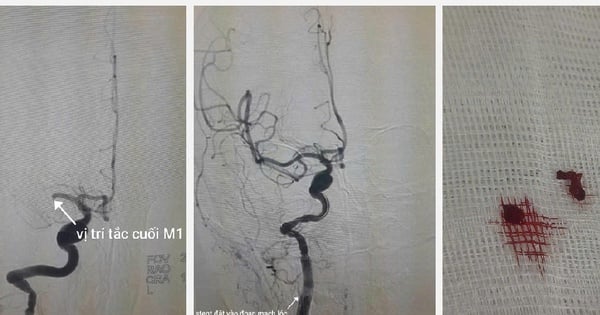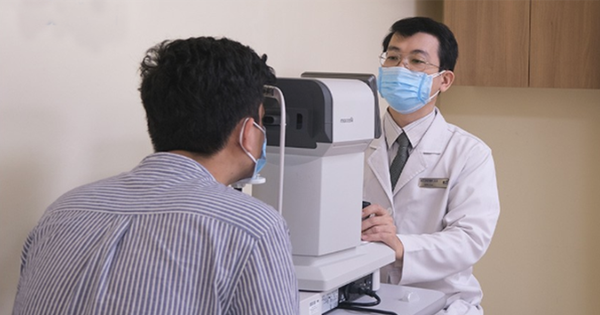Many people, when experiencing blurred vision, subjectively assume it is an eye problem such as nearsightedness, conjunctivitis... without realizing that it could be a sign of a stroke.

Blurred vision can be a potential symptom or early sign of a stroke so be vigilant - Illustration photo
Dr. Pham Thi Thuy, Stroke Center - Phu Tho General Hospital said, blurred vision can be a potential symptom or early sign of stroke, especially when combined with other symptoms.
Sometimes, this condition can occur suddenly or temporarily, making the patient not immediately realize the seriousness of the problem.
Stroke-related causes that can cause blurred vision
According to Dr. Thuy, there are a number of causes related to stroke that can cause blurred vision, including:
- Blockage of blood vessels in the brain (ischemic stroke) : One of the common causes of stroke is when the blood vessels supplying blood to the brain become blocked, leading to a lack of oxygen and nutrients in the brain.
If the blockage occurs in areas of the brain involved in visual function, it can cause blurred vision or partial loss of vision.
- Hemorrhagic stroke (hemorrhagic stroke) : When a blood vessel in the brain ruptures, blood leaks into surrounding areas, which can increase pressure on brain tissue and affect vision. This condition can also lead to blurred vision or loss of vision.
- Affects brain areas related to vision : Areas of the brain that control vision (such as the visual cortex at the back of the brain) can be damaged by a stroke. This can cause the person to feel blurred vision in one or both eyes.
Factors that increase the risk of stroke associated with blurred vision include:
- High blood pressure (hypertension) : This is one of the important risk factors leading to stroke. High blood pressure can increase the risk of blood vessels in the brain rupturing or blood clots forming.
- Cardiovascular disease : Heart problems, such as arrhythmias, can create blood clots that travel to the brain, blocking blood vessels in the brain.
- Diabetes : People with diabetes are at high risk of blood vessel problems and increased risk of stroke.
- Smoking and drinking alcohol : These unhealthy habits increase the risk of blood vessel blockage, contributing to an increased risk of stroke.

Confusion between blurred vision due to stroke and eye diseases is a common problem and subjectivity can lead to serious consequences - Illustration photo
How to differentiate blurred vision due to eye diseases and stroke?
Dr. Thuy noted that eye problems that can cause blurred vision are nearsightedness, astigmatism or farsightedness, these are common problems related to the refractive index of the eye, causing the patient to feel blurred vision when not wearing glasses properly or having changes in vision.
Conjunctivitis is an infection or inflammation of the eye caused by bacteria or a virus, which can cause red eyes and blurred vision;
Glaucoma, increased pressure in the eye, can cause sudden or gradual blurred vision accompanied by eye pain;
Cataract is a condition in which the eye lens becomes cloudy, causing the patient to gradually lose vision.
Blurred vision from a stroke can be temporary. When a stroke occurs, if a blood vessel in the brain becomes blocked or ruptures in an area related to vision, it can cause sudden blurred vision.
However, if the blurred vision lasts only a few minutes and then goes away (often called a mini-stroke or TIA), the person may think it's just a common eye problem and ignore it.
When to call an ambulance?
According to Dr. Pham Thi Thuy, not everyone understands stroke and its signs. Some people think that stroke only happens to the elderly or people with underlying diseases, so they do not think that they can get it.
In fact, many people, when experiencing blurred vision, subjectively assume that it is an eye problem such as nearsightedness, conjunctivitis, or other problems, without realizing that it could be a sign of a stroke.
Confusion between blurred vision due to stroke and eye diseases is a common problem and subjectivity can lead to serious consequences, causing patients to lose the opportunity for early treatment or leaving severe sequelae.
If you or a loved one experiences sudden blurred vision, especially if accompanied by symptoms such as muscle weakness, difficulty speaking, or loss of balance, call 911 immediately.
 Cold weather increases the risk of stroke, heart failure, and respiratory disease.
Cold weather increases the risk of stroke, heart failure, and respiratory disease.Source: https://tuoitre.vn/mo-mat-dot-ngot-canh-giac-co-the-dau-hieu-canh-bao-dot-quy-20241217200820714.htm



![[Photo] Late season Bauhinia flowers hold Hanoians back](https://vstatic.vietnam.vn/vietnam/resource/IMAGE/2025/3/27/41b044c33c5c4f00859ad39a08d3ffa3)


![[Photo] Close-up of the construction of the first dam to retain water on the To Lich River](https://vstatic.vietnam.vn/vietnam/resource/IMAGE/2025/3/27/0b561f1808554026a87a8cb1f79c8113)
























































































Comment (0)